The San Francisco Law Library maintains a comprehensive Law Practice Management Collection, with publications that detail all aspects of opening a practice—hanging your shingle, billing, marketing, finances, risk management, technology, and more. This post introduces the Law Library’s LPM resources that help lawyers manage the trajectory of their career and stay sane in the process. Stay tuned for future installments that highlight the Law Library’s materials on additional LPM topics.
The Anxious Lawyer: An 8-Week Guide to a Joyful and Satisfying Law Practice Through Mindfulness and Meditation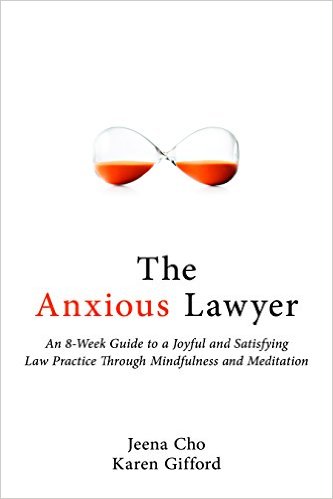 , by Jeena Cho and Karen Gifford. Ankerwycke, 2016.
, by Jeena Cho and Karen Gifford. Ankerwycke, 2016.
The statistics on the mental and emotional state of lawyers are astounding—rates of depression, substance abuse, and suicide are shockingly high among lawyers compared to the rest of the population. Authors Jeena Cho and Karen Gifford draw from their personal experience as stressed-out lawyers to present how they use meditation to ease anxiety, improve productivity, and uncover a sense of satisfaction in practicing law. This guide introduces readers to the various types of meditation, the scientific benefits of meditation, and, of course, a guide to establishing a regular practice. Even if you already have a meditation practice, the authors’ insights on how to weave it into the daily life of a lawyer make this book essential reading for a sane career.
Ms. Cho and Ms. Gifford will speak at the Law Library on December 14th as part of our Lunchtime Speakers Series. We hope you will join us for this free program!
Coaching for Attorneys: Improving Productivity and Achieving Balance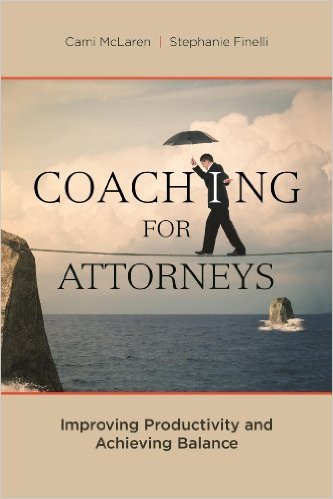 , by Cami McLaren and Stephanie J. Finelli. American Bar Association, Section of Dispute Resolution, 2014.
, by Cami McLaren and Stephanie J. Finelli. American Bar Association, Section of Dispute Resolution, 2014.
Lawyers are generally ill-prepared to manage the personal and emotional aspects of practice, such as the conflict of litigation or the interpersonal skills needed for solid relationships with clients or opposing counsel. These important aspects of lawyering receive further short shrift when layered with the inherent stress of practicing law. The result is that many lawyers feel like they are just trying to get through the day, but Coaching for Attorneys gives lawyers the necessary tools to change that. Written by two lawyers-turned-business-coaches, this book empowers lawyers to take a stand against “the drift” and instead to consciously make value-based decisions. It instructs on taking accountability, gauging your level of commitment, identifying personal obstacles, the importance of mindset and self-maintenance, time management, communication skills, “enrolling” others into working toward your vision, and more. Best of all, the authors make it easy to translate the concepts they discuss into action with step-by-step assignments. Read this book before hiring a business coach—while it may not be a substitute, it would make a subsequent relationship with a coach more beneficial.
The Good Lawyer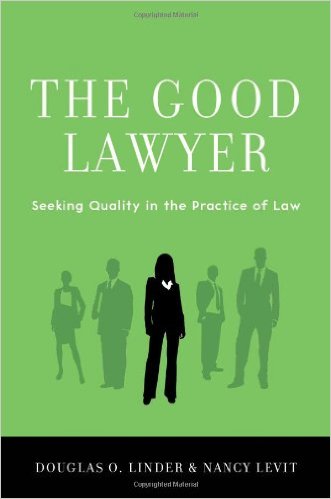 , by Douglas O. Linder and Nancy Levit. Oxford University Press, 2014.
, by Douglas O. Linder and Nancy Levit. Oxford University Press, 2014.
It’s easy to become overwhelmed with the day-to-day endeavors of law practice and lose sight of the big picture. But if you ever find yourself wondering how to find true quality in a legal career—how to be a good lawyer—you’ll want to read this inspiring book. In contrast to the emphasis on rationality and emotionlessness that forms the foundation of law school instruction, the authors insist that a quality career hinges upon personal investment and doing work that you care about. Using examples of exceptional lawyers such as Gerry Spence and John Doar, the authors examine how to strengthen traits such as empathy, courage, willpower, respect, intuition, and integrity to find quality in the practice of law. If you’ve lost touch with what drew you to the law, this book will transform how you view the potential of your career.
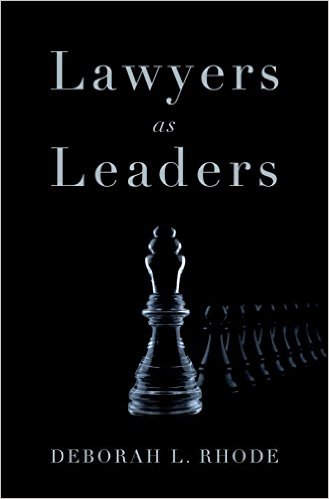 Lawyers as Leaders, by Deborah L. Rhode. Oxford University Press, 2013.
Lawyers as Leaders, by Deborah L. Rhode. Oxford University Press, 2013.
Author Deborah Rhode observes an interesting paradox—lawyers are frequently trusted with leadership positions throughout the government and private sector, yet they don’t necessarily have the skills to perform well in this capacity. Plus, existing leadership publications overlook lawyers as a unique group, and legal education falls short in teaching leadership skills. An esteemed writer on legal ethics and the director of Stanford’s Center on the Legal Profession, Ms. Rhode is well poised to argue that although lawyers achieve leadership positions by virtue of their ambition and quest for personal achievement, success as a leader depends on “subordinating these self-interests to a greater good.” She explores the nature of leadership, its styles, how to develop leadership traits, ethics and scandals, diversity, leadership in law firms, and the role of lawyers in spearheading social change. Whether you aim to increase your ability to influence those around you in a relatively smaller sphere, or whether you have grander objectives, this book will prepare you for the journey.
 The Organized Lawyer, by Kelly Lynn Anders. Carolina Academic Press, 2nd ed., 2015.
The Organized Lawyer, by Kelly Lynn Anders. Carolina Academic Press, 2nd ed., 2015.
This book tackles a topic that is often dismissed as mere fussiness or cleanliness. In actuality, however, organization directly relates to how lawyers perform their work, and perhaps most importantly, how clients perceive their lawyer’s ability to be an effective advocate. A self-assessment questionnaire helps you determine what type of organizer you are, and then the best approach to organizing for each type is applied to office layouts, desk arrangements, paper and electronic case files, financial records, planners and organizers, home and mobile offices, and marketing and social media. This comprehensive evaluation of how to be an organized lawyer will improve productivity, focus, client relationships, and the bottom line.
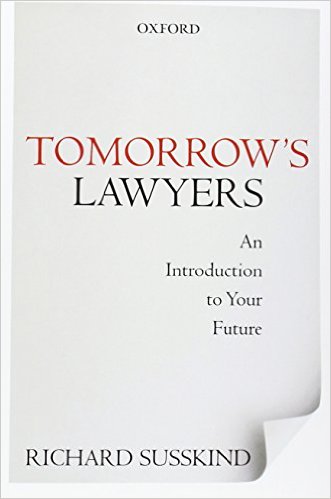 Tomorrow’s Lawyers, by Richard Susskind. Oxford University Press, 2013.
Tomorrow’s Lawyers, by Richard Susskind. Oxford University Press, 2013.
The changing nature of the legal profession has been a much-discussed topic in recent years. If you’ve been giving these rumors scant attention as you plod along in your practice, Tomorrow’s Lawyers will snap you to attention. Best-selling author Richard Susskind persuasively argues that the legal profession is due for disruption, and lawyers need to emulate Wayne Gretzky and “’skate to where the puck’s going, not where it’s been.’” Susskind analyzes the primary catalysts for change in the legal market—the more-for-less challenge, liberalization, and information technology—and foresees a future with online legal services that will expand access to justice, virtual courts to maximize scarce resources, and new jobs as the need for traditional lawyers declines. Follow Susskind’s strategies for success and join the ranks of the innovators.
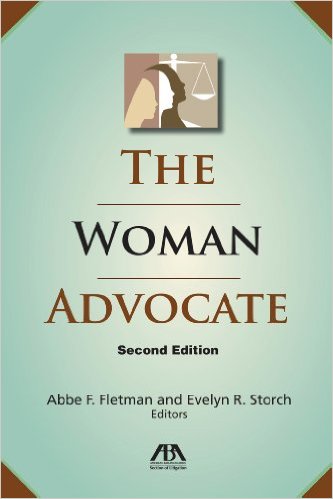 The Woman Advocate, edited by Abbe F. Fletman and Evelyn R. Storch. American Bar Association, Section of Litigation, 2nd ed., 2010.
The Woman Advocate, edited by Abbe F. Fletman and Evelyn R. Storch. American Bar Association, Section of Litigation, 2nd ed., 2010.
There’s no question that women have more opportunity as lawyers than ever before, but equally clear is that equality has not yet been achieved. This book gathers the advice and perspective of notable women lawyers on topics ranging from managing bias, rainmaking, race, courtroom persona, emotional intelligence, solo practice, work-life balance, and much more. The practical advice contained in these lessons learned will help you over hurdles in the path of your own career, and ultimately, toward equality in the profession as a whole.
Andrea Woods is a Reference Librarian at the San Francisco Law Library


